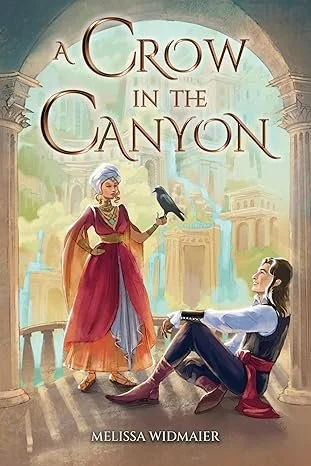Book Review: The Crow in the Canyon by Melissa Widmaier
“If Nerwi (the wind) wants to eavesdrop on us, that’s her problem.” Who speaks to the wind that way? Marl Ganwin, that's who. This story is not a children's fairy tale but a complex fantasy novel with political intrigue worthy of Shakespeare.
Melissa Widmaier's The Crow in the Canyon is the second installment in her Realm of Light series. The plot begins with the Ganwin family in a situation where they must leave their hometown due to the political situation. The patriarch of the family, once a respected general, has been falsely accused of murder.
Marl, the younger Ganwin son mentioned above, was widowed during these events, and this plays no mean role in driving the plot forward. This particular MC has many of the elements of the hero's journey, but it is no cookie-cutter formula from Joseph Campbell. Marl goes through many ups and downs with his relationship to his elemental, the wind. Neither does his rival and brother, Nastir, who has a connection to earth. At times, their preternatural mentors are more like bullies than they are like warm, wise guides prevalent in most fantasy.
There is an enemy to be defeated, but the protagonists can't beat him by merely killing him. At specific points of the story, the heroes must join him. Of course, there are also many ties between the factions by both blood and love that can only be navigated with careful negotiation.
Fans of Lord of the Rings or The Chronicles of Narnia might argue that this complexity is inappropriate in fantasy, but that is a matter of taste. Macbeth can be considered a fantasy, but it is also chock-full of familial and political intrigue, and that certainly doesn’t detract from it.
The novel might be too slow-paced for many readers, but it is not filled with meaningless fluff. The characters' relationships are thoroughly drawn out in ways that are relevant to the plot.
The world of Artanus is a mystery. There is no apparent connection between it and our own world. You can only speculate. In this respect, it's like Middle-earth, but without the maps. However, the author's descriptions are so vivid that you don't need them. Her prose enables the reader to imagine a three-dimensional universe where the events unfold. Yet, the world is still mysterious. There is vivid exposition on the environment surrounding the characters, but little about what happens beyond the immediate realm. Is Artanus the whole world, a continent, or just the realm where events occur? This uncertainty adds to the world's strangeness. It could leave the reader feeling somewhat unmoored by the lack of context, or curious about what is happening beyond, especially when it comes to the elementals and how they interact with ordinary, mortal beings.
The work is complex and plodding. While there is adventure, there is less fast-paced action and more slow build-up in establishing relationships and motivations compared to much fantasy literature. This timing could be a strength or a weakness, depending on the reader's taste, but the Realm of Light series is definitely worth reading at least once.


